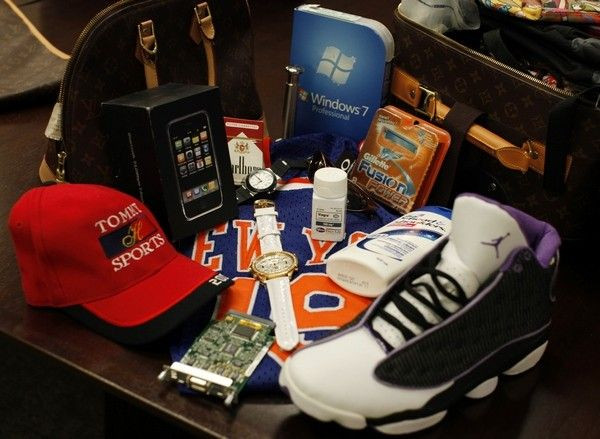Feds bust knock-off sales sites

Selling counterfeit items over the Internet became a little more difficult today, as federal law enforcement officers executed seizure orders against the domain names of 82 commercials websites that, authorities said, sold and distributed counterfeit goods and copyrighted works.
The coordinated federal law enforcement operation targeted online retailers of a diverse array of counterfeit goods, including sports equipment, shoes, handbags, athletic apparel and sunglasses as well as illegal copies of copyrighted DVD boxed sets, music and software, according to U.S. Attorney General Eric Holder and Director John Morton of the Department of Homeland Security's Immigration and Customs Enforcement, or ICE.
By seizing these domain names, we have disrupted the sale of thousands of counterfeit items, while also cutting off funds to those willing to exploit the ingenuity of others for their own personal gain, Holder said.
The sale of counterfeit U.S. brands on the Internet steals the creative work of others, costs our economy jobs and revenue and can threaten the health and safety of American consumers, Morton said. The protection of intellectual property is a top priority for Homeland Security Investigations and the National Intellectual Property Rights Coordination Center. We are dedicated to protecting the jobs, the income and the tax revenue that disappear when counterfeit goods are trafficked.
But Gregory Evans, CEO of LIGATT Security International, a Norcross, Georgia-based cybersecurity firm, said cyber crooks can simply open other websites and get right back into selling counterfeit goods and other nefarious Internet activities.
To truly solve the problem, the big Internet service providers need to work together to identify and block these criminal enterprises from using their networks, Evans said.
Evans said that people purchasing counterfeit goods on the Web are either gullible and believe these items genuine and remarkably discounted, or they know they are counterfeit or bootlegged items and simply want them at reduced prices.
There are phony Louis Vutton handbags sold on some Internet sites that are marked down 60 to 90 percent, he said. If people truly think they can buy a Louis Vutton bag on the Internet cheaper than they can purchase a handbag at Target, they really are gullible.
If the offer seems too good to be true, then it probably is, Evans said.
With just a little diligence, you can recognize whether a site is legitimate or not, Evans said. If it is offering high-end items, then the site should provide an address and a telephone number in its contact information. If all it provides is an email form - that's a bad sign.
Some cyber-crook sites provide an address but no phone number. But the address is a phony one or of some vacant lot, and a simple search on Google maps may rouse enough suspicion to forego using the site to purchase anything.
Many of these sites are not concerned with selling counterfeit goods. They are scam sites and interested only in your personal information, Evans said.
Certain websites will make it appear as if you are purchasing something, so the criminals can obtain your credit card information, as well as your email and your physical address, to use or sell any or all this information, so that someone may illegally enter your computer or your bank account, or to make purchases with your credit card.
That is why people should always know who they are purchasing things from over the Internet, he said.
Cybersecurity in its many aspects has become more and more of a subject among law enforcement and lawmakers. Currently, there is a bipartisan bill in the U.S. Senate called the Combating Online Infringement and Counterfeits Act, sponsored by Sens. Patrick Leahy, D-VT and Orrin Hatch, R-UT, which would give the Justice Department increased powers to act on its own authority in shutting down piracy websites.
Each year, online piracy and the sale of counterfeit goods cost American businesses billions of dollars, and result in hundreds of thousands of lost jobs, Leahy said. The Combating Online Infringement and Counterfeits Act will protect the investment American companies make in developing brands and creating content and will protect the jobs associated with those investments.
The bill is currently on the Senate schedule but, considering the full plate Congress is looking at in its brief lame-duck session, it is likely the anti-piracy measure will wait until at least next year.
© Copyright IBTimes 2024. All rights reserved.




















